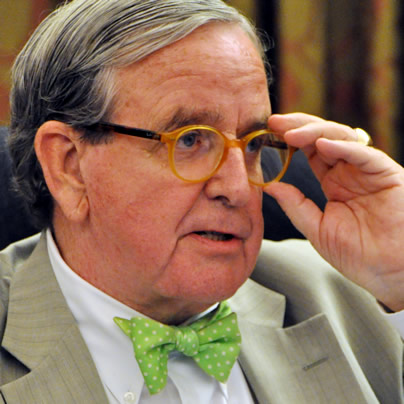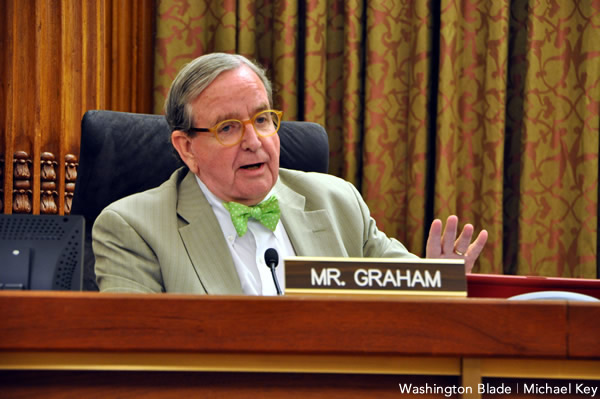Local
Graham fires back at opponent, files ethics complaint
Most candidates boast pro-LGBT records in six D.C. Council races


D.C. Council member Jim Graham (D-Ward 1) filed a complaint with the city’s Inspector General against his Democratic opponent Brianne Nadeau. (Washington Blade file photo by Michael Key)
Gay D.C. Council member Jim Graham (D-Ward 1) added fuel to the fire in the hotly contested Ward 1 D.C. Council race this week when he revealed he filed a complaint last Friday with the city’s Inspector General against his Democratic opponent Brianne Nadeau.
The complaint, which Graham released to the Washington Post, accuses Nadeau of underreporting her income in 2009 to enable her to be eligible for an interest-free city loan to purchase a condominium under a city program for low- to moderate-income residents.
Nadeau released a statement saying she did “everything 100 percent by the book” to obtain her loan and accused Graham of “abusing his office and spending taxpayer dollars to attack a political opponent.”
The Ward 1 Council seat for which Graham and Nadeau are competing is one of six Council seats up for grabs in the city’s April 1 Democratic primary. The other seats in contention are the Council Chair position, one of two at-large seats, and the seats representing Wards 3, 5 and 6.
Also on the primary ballot is D.C. congressional Del. Eleanor Holmes Norton (D), who’s running unopposed; and candidates running for the shadow U.S. Senate and House seats.
Graham, who has held the Ward 1 Council seat for 16 years, is running for a fifth term in office in what observers say is his toughest re-election bid to date.
In his complaint, Graham charges that he observed what he believes to be “serious irregularities” and “perhaps fraud” in a loan application filed by Nadeau in which she allegedly failed to report that her income had increased from the time she initially applied for the loan two years earlier.
Under rules for the Home Purchase Assistance Program, known as HPAP, Nadeau would have been eligible for a loan of $33,050 to cover her down payment and closing costs if her income was below $50,000, which Graham says it was when she first applied for the loan in 2007.
But according to Graham, Nadeau’s income rose to over $50,000 by 2009, when she received the loan while employed by the office of U.S. Rep. John Sarbanes (D-Md.). Under the HPAP program, Nadeau’s higher income meant she was only eligible for a loan of $14,450. The fact that she received the higher amount, according to Graham, raises serious questions about her ethical conduct as well as to whether she committed fraud.
Tom Fazzini, Nadeau’s campaign manager, told the Blade on Wednesday that Nadeau fully reported all of her income, including the income above $50,000, to the Greater Washington Urban League, which the city had retained to administer the HPAP program. He said Graham took out of context an email Nadeau sent to the Urban League saying her income had not changed since 2007.
When asked by the Post to explain a possible discrepancy in her reported income in the email in support of her loan application, “Nadeau said that her base salary had not changed but that she had received bonuses that increased her pay,” the Post reported.
“I have made all the documentation publicly available, which clearly shows that Jim Graham is distorting communications I had with him when I sought his help as a constituent five year ago,” Nadeau said in her statement.
“This is the same corrupt behavior that caused the D.C. Council to reprimand him and strip him of responsibility,” she said.
Fazzini said HPAP officials initially approved her loan at the higher amount when her income was at a lower level but cancelled the loan contract when she was unable to complete the purchase of the condo within a one-year deadline. He said the purchase couldn’t be completed because the condo building was still under construction and the delay in its completion prevented Nadeau from making the purchase at that time.
According to Fazzini, HPAP officials may have had the discretion to allow Nadeau to obtain the higher loan amount under a new contract the following year, even though her income rose above the $50,000 limit, because the missed deadline for the earlier contract was the fault of the condo developer rather than Nadeau’s.
Graham’s allegation against Nadeau follows a barrage of attacks against him by Nadeau during the past two months over a vote last year by the City Council to reprimand Graham on an ethics violation. The Council’s action, in the form of an 11 to 2 vote, stemmed from allegations that he improperly intervened in the approval process for a Metro development project.
Graham has said he acted in what he believed to be in the best interests of his constituents by arguing against one of two developers seeking the Metro contract on grounds that the developer was unqualified to do the work.
District of Columbia
Gay ANC member announces candidacy for Ward 1 D.C. Council seat
Community leader Brian Footer seeking seat held by Brianne Nadeau

Gay Advisory Neighborhood Commissioner Brian Footer, a community activist who has been involved for many years in local and national government affairs, has announced his candidacy for the Ward 1 D.C. Council seat up for election in 2026.
Footer, a Democrat, will be running in the city’s June 2, 2026, Democratic primary for the Ward 1 Council seat, but it is uncertain whether he will be running against incumbent Ward 1 Council member Brianne Nadeau (D). Nadeau has not yet announced if she plans to run for re-election for a fourth term following her 12 years on the Council.
Nadeau has been a longtime vocal supporter of the LGBTQ community.
If Footer were to win the primary and the November 2026 general election, he would become the Council’s second openly gay member. Ward 5 Council member Zachary Parker (D) is currently the 13-member Council’s only gay member.
Footer is a three-term ANC commissioner who currently serves as Chair of ANC 1E, which represents the city’s Adams Morgan neighborhood.
“Brian has worked at every level of government — federal, state, and local — building a career rooted in public service, aging policy, and inclusive urban planning,” a statement on his campaign website says.
“I’m running for Council because too many people in Ward 1 are doing everything right and still feel ignored by the city they call home,” Footer states on his website.
“I’m running because we can do better,” his statement continues. “That means making housing more affordable, addressing homelessness with real solutions, and keeping our neighborhoods safe with smart, community focused strategies.”
When contacted by the Washington Blade for comment, Nadeau said she was not ready at this time to discuss her plans about running again or about Footer’s candidacy.
“The primary is a ways away, and I’m very focused right now on the budget and the stadium deal and all the work that we’re doing at the Council,” she told the Blade. “So, I really haven’t had time to turn to my plans. So, as a result, I’m also not going to be commenting on anybody else who is determined that they’re running at this time.”
She first won election to the Council in 2014 after she defeated four-term gay Ward 1 Council member Jim Graham in the Democratic primary after Graham became embroiled in an ethics controversy.
In the 2022 Democratic primary Nadeau defeated gay challenger Salah Czapary in a three-candidate race, by a margin of 48.5% of the vote compared to Czapary’s 30.9%.
With the third candidate, Sabel Harris, receiving 20.4%, the outcome showed that the two challengers had a combined total vote count higher than Nadeau.
Further details of Footer’s candidacy can be accessed from his campaign website, brianfooterdc.com.
District of Columbia
Gay GOP group hosts Ernst, 3 House members — all of whom oppose Equality Act
Log Cabin, congressional guest speakers mum on June 25 event

U.S. Sen. Joni Ernst (R-Iowa) and three women Republican members of the U.S. House appeared as guest speakers at the June 25 meeting of Log Cabin Republicans of D.C., the local chapter of the national LGBTQ Republican group with that same name.
The U.S. House members who joined Ernst as guest speakers at the Log Cabin meeting were Celeste Maloy (R-Utah), Kat Cammack (R-Fla.), and Julia Letlow (R-La.).
Neither D.C. Log Cabin Republicans President Andrew Minik nor spokespersons for Ernst or the three congresswomen immediately responded to a request by the Washington Blade for comment on the GOP lawmakers’ appearance at an LGBTQ GOP group’s meeting.
“Please join us for an inspiring evening as we celebrate and recognize the bold leadership and accomplishments of Republican women in Congress,” a D.C Log Cabin announcement sent to its members states.
“This month’s meeting will highlight the efforts of the Republican Women’s Caucus and explore key issues such as the Protection of Women and Girls In Sports Act and the broader fight to preserve women’s spaces in society,” the message says.
It was referring to legislation pending in Congress calling for banning transgender women from participating in women’s sports events.
According to media reports, Ernst and the three congresswomen have expressed opposition to the Equality Act, the longstanding bill pending in Congress calling for prohibiting discrimination based on sexual orientation and gender identity in the areas of employment, housing, and public accommodations.
The Log Cabin announcement says the meeting was scheduled to take place at the Royal Sands Social Club, which is a restaurant and bar at 26 N St., S.E. in the city’s Navy Yard area.
D.C. Log Cabin member Stuart West, who attended the meeting, confirmed that Ernst and the three congresswomen showed up and spoke at the event.
“It was a good turnout,” he said. “I would definitely say probably 30 or 40 people attended.” West added, “Four women came to talk to a group of mostly gay men. That’s something you don’t see very often.”
District of Columbia
D.C. police seek public’s help in July 5 murder of trans woman
Relative disputes initial decision not to list case as hate crime

D.C. police are seeking help from the public in their investigation into the murder of a transgender woman who they say was shot to death at about 12:30 a.m. on Saturday, July 5, on the 2000 block of Benning Road, N.E.
But the police announcement of the fatal shooting and a police report obtained by the Washington Blade do not identify the victim, 28-year-old Daquane ‘Dream’ Johnson of Northeast D.C., as transgender. And the police report says the shooting is not currently listed as a suspected hate crime.
It was local transgender activists and one of Johnson’s family members, her aunt, who confirmed she was transgender and said information they obtained indicates the killing could have been a hate crime.
“On Saturday, July 5, at approximately 12:51 a.m., Sixth District officers were flagged down in the 2000 block of Benning Road, Northeast, for an unconscious female,” a July 5 D.C. police statement says. “Upon arrival, officers located an adult female victim suffering from gunshot wounds,” it says.
“D.C. Fire and EMS responded to the scene and transported the victim to a local hospital where after all lifesaving efforts failed and the victim was pronounced dead,” the statement says.
A separate police flyer with a photo of Johnson announces an award of $25,000 was being offered for information leading to the arrest and conviction of the person or persons responsible for the murder.
The flyer identifies D.C. police Homicide Detective Natasha Kennedy as being the lead investigator in the case and says anyone with information about the case should contact her at 202-380-6198.
Longtime D.C. transgender rights advocate Earline Budd told the Blade that one of the police investigators contacted her about the case and that she also spoke to Detective Kennedy. Budd said police confirmed to her that Johnson was a transgender woman.

One of Johnson’s family members, Vanna Terrell, who identified herself as Johnson’s aunt, told the Blade that Johnson used the first name of Dream and had planned to legally adopt that name instead of Daquane but had not gotten around to doing so.
Terrell said she and other family members learned more about the incident when one of two teenage high school students who knew Johnson’s brother contacted a friend and told the friend that they recognized Johnson as they witnessed the shooting. Terrell said the friend then called her to tell her what the friend learned from the two witnesses.
According to Terrell, the witnesses reportedly saw three men approach Johnson as Johnson walked along Benning Road and one of them called Johnson a derogatory name, leading Terrell to believe the men recognized Johnson as a transgender woman.
Terrell said one of the witnesses told the friend, who spoke to Terrell, that the man who shot Johnson kept shooting her until all of the bullets were fired. Budd, who said she spoke to Terrell, who also told her what the witnesses reported, said she believed the multiple shots fired by the shooter was an “overkill” that appears to have been a hate crime. Terrell said she too believes the murder was a hate crime.
In response to an inquiry from the Blade, Officer Ebony Major, a D.C. police spokesperson, stated in an email, “At this point there is nothing in the investigation that indicates the offense was motivated by hate or bias.”
Terrell said a memorial gathering to honor Johnson’s life was scheduled to be held Saturday, July 12, at River Terrace Park, which is located at 500 36th St., N.E. not far from where the shooting occurred.

-

 Federal Government2 days ago
Federal Government2 days agoTreasury Department has a gay secretary but LGBTQ staff are under siege
-

 Virginia3 days ago
Virginia3 days agoDefying trends, new LGBTQ center opens in rural Winchester, Va.
-

 District of Columbia2 days ago
District of Columbia2 days agoGay GOP group hosts Ernst, 3 House members — all of whom oppose Equality Act
-

 Opinions4 days ago
Opinions4 days agoUSAID’s demise: America’s global betrayal of trust with LGBTQ people










